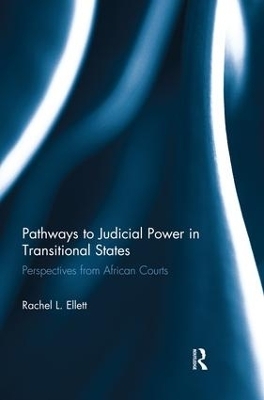
Pathways to Judicial Power in Transitional States
Perspectives from African Courts
Seiten
2015
Routledge (Verlag)
978-1-138-93011-7 (ISBN)
Routledge (Verlag)
978-1-138-93011-7 (ISBN)
This book examines the complex relationship that exists between the construction of judicial power, and the institutional characteristics of the courts and their regime setting. It examines the intriguing connection between the construction of judicial power on the one hand, and the institutional characteristics of the courts and regime setting on the other. The book asks whether courts are rendered powerful by virtue of their institutional characteristics or by a supportive, perhaps acquiescent, regime setting.
By analyzing the historical pathways of courts in Uganda, Tanzania and Malawi, this book argues that the emergence of judicial power since the colonial period, though fraught with many challenges, presents a unique opportunity for consolidating democracy. The book examines in detail the significant political decisions of the upper-level courts in Uganda, Tanzania and Malawi from the colonial period to the present day, analyzing them in relation to changes in the political environment over time. Analysis of these decisions is also supplemented by in-depth interviews with judges, lawyers and other important stakeholders in the judicial processes. This book demonstrates that even in the most challenging regime environments, effective institutions and determined individuals can push back against interference and issue politically powerful, independent decisions but the way in which judiciaries respond to this regime pressure varies enormously across countries and regions.
By analyzing the historical pathways of courts in Uganda, Tanzania and Malawi, this book argues that the emergence of judicial power since the colonial period, though fraught with many challenges, presents a unique opportunity for consolidating democracy. The book examines in detail the significant political decisions of the upper-level courts in Uganda, Tanzania and Malawi from the colonial period to the present day, analyzing them in relation to changes in the political environment over time. Analysis of these decisions is also supplemented by in-depth interviews with judges, lawyers and other important stakeholders in the judicial processes. This book demonstrates that even in the most challenging regime environments, effective institutions and determined individuals can push back against interference and issue politically powerful, independent decisions but the way in which judiciaries respond to this regime pressure varies enormously across countries and regions.
Rachel Ellett is Assistant Professor of Political Science at Beloit College. She holds a PhD in Political Science from Northeastern University. Her research focuses on comparative judicial politics, regional courts, and the rule of law and democratization in commonwealth sub-Saharan Africa and the Caribbean.
1. Introduction: African Courts in Comparative Perspective 2. Pathway to Judicial Empowerment 3. From Colonial Conception to Authoritarian Consolidation 4. Transition to Multipartyism 5. Second Multiparty Election 6. Democratic and Judicial Stagnation 7. Conclusion
| Erscheint lt. Verlag | 9.6.2015 |
|---|---|
| Verlagsort | London |
| Sprache | englisch |
| Maße | 156 x 234 mm |
| Gewicht | 362 g |
| Themenwelt | Recht / Steuern ► Allgemeines / Lexika |
| Recht / Steuern ► EU / Internationales Recht | |
| Sozialwissenschaften ► Kommunikation / Medien ► Journalistik | |
| Sozialwissenschaften ► Kommunikation / Medien ► Medienwissenschaft | |
| Sozialwissenschaften ► Politik / Verwaltung ► Staat / Verwaltung | |
| ISBN-10 | 1-138-93011-3 / 1138930113 |
| ISBN-13 | 978-1-138-93011-7 / 9781138930117 |
| Zustand | Neuware |
| Haben Sie eine Frage zum Produkt? |
Mehr entdecken
aus dem Bereich
aus dem Bereich


